Britisches Territorium im Indischen Ozean |
|
|
|
| Übersicht – Contents: | |
Diese Seite ist Teil des Projektes
Britisches Territorium im Indischen Ozean |
|
|
|
| Übersicht – Contents: | |
Flaggen – Flags: |
|
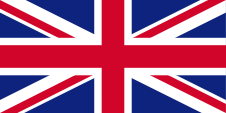 |
seit/since 1810, |
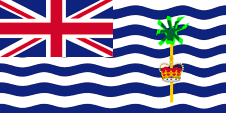 |
seit/since 1990, |
 |
seit/since 1974, Flagge der USA – flag of the USA, Seitenverhältnis – ratio = 10:19, Quelle/Source, nach by: Flags of the World, Corel Draw 4   |
|
|
|
historische Flaggen – historical Flags: |
|
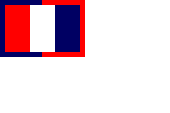 |
1790–1794, Flagge Frankreichs – flag of France, Quelle/Source, nach/by: Die Welt der Flaggen  |
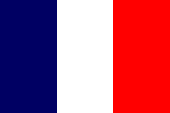 |
1794–1810, Flagge Frankreichs – flag of France, Seitenverhältnis – ratio = 2:3, Quelle/Source, nach/by: Corel Draw 4   |
 |
seit/since 1810, |
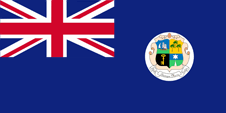 |
1869–1903, Mauritius, Flagge der Regierung (Staatsflagge) – flag of the government (state flag), Seitenverhältnis – ratio 1:2, Quelle/Source, nach/by: Flags of the World |
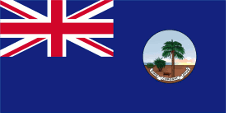 |
1903–1961, Seychellen – Seychelles, |
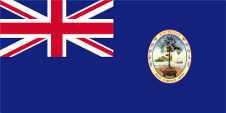 |
1961–1965, Seychellen – Seychelles, |
|
|
|
Bedeutung/Ursprung der Flagge – Meaning/Origin of the Flag: |
|
|
Das Chagos-Archipel
gehörte von 1810 bis 1903 zur britischen Kolonie Mauritius und ab 1903 zur
britischen Kolonie der Seychellen. 1965 wurde die Inselgruppe mit den
Aldabra-Inseln, den Farquar-Inseln, sowie den Inseln Desroches, Platte und
Coetivy zum "Britischen Territorium im Indischen Ozean" zusammengeschlossen.
1967 wurden alle Inseln, außer dem Chagos-Archipel an die Seychellen
abgetreten. Da es keine ursprüngliche Bewohner und keine sonstigen zivilen
Einwohner gab (sie wurden zwischen 1969 und 1971 nach Mauritius umgesiedelt)
und die Inseln nur militärisch genutzt wurden und werden, gibt es keine
Zivilverwaltung und von daher keinen Bedarf an dafür in Frage kommende
Flaggen. Dennoch gibt es einen britischen Kommissar der im "Foreign,
Commonwealth and Development Office" in London residiert. Das britische
Militär nutzt für das Territorium die Flagge Großbritanniens bzw. eigene
militärische Flaggen, denn ab dem Zeitpunkt der britischen Inbesitznahme im
Jahre 1810 repräsentierten der einzelne Bürger und auch die Behörden ihren
Status als Bürger oder Organe der britischen Nation, verkörpert im United
Kingdom, durch die Verwendung des Union Jack, dann "Union Flag" genannt. Das
US-amerikanische Militär nutzt die Flagge der USA bzw. eigene militärische
Flaggen. Die Flagge des BIOT folgt nicht dem britischen Ensign-System, denn das Grundtuch der Flagge besteht aus weißen und blauen Wellenlinien, die den Indischen Ozean darstellen sollen. Der Union Jack in der Oberecke weist auf die Verbindungen zu Großbritannien hin. Im fliegenden Ende befindet sich das Badge. Es zeigt eine Palme, ein Hinweis auf die Vegetation, und ein Abbild der britischen Krone. Es steht für die einzelnen Inseln, insbesondere für die Insel Diego Garcia, die als einzige bewohnt ist. Die Flagge wurde, wie das Badge, im Jahre 1990 für den britischen Kommissar eingeführt. Dennoch wird sie auf dem Territorium verwendet und die Publikation "Flags of all Nations" (eine Dienstvorschrift) des britischen Verteidigungsministeriums bezeichnet die Flagge als "Nationalflagge". Großbritannien hatte in Jahr 1864 ein Flaggensystem eingeführt, in dem: • Kriegsschiffe einen sogenannten "White Ensign" (Marineflagge), eine weiße Flagge oft mit durchgehendem roten Georgskreuz und mit dem Union Jack in der Oberecke, • Handelsschiffe einen "Red Ensign" (auch "Civil Ensign" → Bürgerflagge genannt, die eigentl. Handelsflagge), eine rote Flagge mit dem Union Jack in der Oberecke, und • Dienstschiffe einen "Blue Ensign" (Regierungsflagge → die eigentl. Staatsflagge), eine blaue Flagge mit dem Union Jack in der Oberecke führten. |
The Chagos archipelago
belonged to the British colony of Mauritius from 1810 to 1903 and to the
British colony of the Seychelles from 1903. In 1965, the archipelago was
merged with the Aldabra Islands, the Farquar Islands and the islands of
Desroches, Platte and Coetivy to form the "British Indian Ocean Territory".
In 1967, all islands except the Chagos Archipelago were ceded to the
Seychelles. As there were no original inhabitants and no other civilian
inhabitants (they were relocated to Mauritius between 1969 and 1971) and the
islands were and are only used for military purposes, there is no civilian
administration and therefore no need for such flags. Nevertheless, there is a British Commissioner who resides at the "Foreign, Commonwealth and Development Office" in London. The British military uses the flag of United Kingdom or its own military flags for the territory, because from the time of British appropriation in 1810, individuals, citizens and also the authorities represented their status as citizens or organs of the British nation, embodied in the United Kingdom, through the use of the Union Jack, then called the "Union Flag". The US military uses the flag of the USA or its own military flags. The flag of the BIOT does not follow the British ensign system, as the bunting of the flag consists of white and blue wavy lines, which are intended to represent the Indian Ocean. The Union Jack in the top corner indicates the links with United Kingdom. The badge is located at the flying end. It shows a palm tree, a reference to the vegetation, and an image of the British crown. It symbolises the individual islands, in particular the island of Diego Garcia, which is the only one that is inhabited. The flag, like the badge, was introduced for the British Commissioner in 1990. Nevertheless, it is used on the territory and the publication "Flags of all Nations" (a service regulation) of the British Ministry of Defence refers to the flag as the "national flag". United Kingdom introduced a flag system in 1864 in which: • war ships fly the "White Ensign" (naval flag), a white flag often with an uninterrupted red St. George's-Cross and with the Union Jack in the upper staff quadrant of the flag, • merchant ships fly a "Red Ensign" (also named "Civil Ensign" → civil flag, the real merchant flag), a red flag with the Union Jack in the upper staff quadrant of the flag, and • governmental ships fly the "Blue Ensign" (flag for the use by the gouvernment → the actual state flag), a blue flag with the Union Jack in the upper staff quadrant of the flag. |
| Quelle/Source: Flaggen Enzyklopädie, Wikipedia (EN), Flags of all Nations | |
|
|
|
| Landkarte – Map: |
Lage – Position: |
Landkarte des Landes – Map of the Country: |
|
|
Zahlen und Fakten – Numbers and Facts: |
|
|
|
|
|
|
|
|
|
|
|
|
|
|
|
|
|
|
Geschichte: |
| 1810
· Inbesitznahme durch Großbritannien 1903 · Ausgliederung aus Mauritius, Angliederung an die Seychellen 1965 · Ausgliederung aus den Seychellen, Bildung des BIOT 1966 · US-amerikanisch/britischer Nutzungsvertrag 1969–1971 · Aussiedlung der Bevölkerung 1976 · Gebietsabtretungen an die Seychellen Die Kolonie Britisches Territorium im Indischen Ozean (BIOT) wurde 1965 gebildet, und umfasst den Chagos-Archipel, wobei Diego Garcia die größte dieser aus Korallen bestehenden Inselgruppe ist, und ein Meeresgebiet von insgesamt 54.500 km². Das BIOT hat schon lange keine natürliche Bevölkerung mehr. Die ursprünglichen Bewohner der Inseln – hier wurde früher ausschließlich Kopra produziert – wurden 1969–1971 nach Mauritius evakuiert. Die heutigen Einwohner sind das Personal eines britisch/US-amerikanischen Militärstützpunktes auf der Insel Diego Garcia. Der Chagos-Archipel wurde 1965 von der früheren britischen Kolonie Mauritius zurückbehalten. Während der Verhandlungen über die Unabhängigkeit von Mauritius (1968) machte Großbritannien ihren Verbleib unter britischer Herrschaft zur Vorbedingung. Die ursprünglich ebenfalls dem BIOT angegliederten Inselgruppen Aldabra, Farquhar und Desroches mussten 1976 an die Seychellen zurückgegeben werden. Die nun unbewohnten Inseln haben durch ihre Nähe zur Golfregion ausschließlich strategische Bedeutung. Im Jahre 1966 zwischen Großbritannien und den USA abgeschlossene Abkommen sahen ursprünglich die gemeinsame Nutzung des Territoriums für mindestens 50 Jahre vor. Trotz Protest der Anliegerstaaten, wird Diego Garcia seit 1974 zu einem Marine- und Luftwaffenstützpunkt der USA ausgebaut. Forderungen der Regierung von Mauritius nach Rückgabe der Inseln, die unter anderem auch von der OAU von Indien unterstützt wurden, wies die Regierung Großbritanniens stets zurück. Sobald kein Bedarf mehr für eine militärische Nutzung des Gebietes besteht, wird Großbritannien die Inseln jedoch an Mauritius übergeben. 03.10.2024 · Die Premierminister von Großbritannien und von Mauritius geben bekannt, dass die Souveränität über die Inseln des BIOT (Chagos-Archipel) an Mauritius übergeht und das BIOT damit aufgelöst werden wird; die zwischen 1969 und 1971 ausgesiedelten Chagossianer sollen ein Recht auf Rückkehr erhalten, jedoch verbleibt die Insel Diego Garcia – mit den britischen und US-amerikanischen Militärbasen – für weitere 99 Jahre mit eigenen Verwaltungsrechten bei Großbritannien. |
|
|
History: |
| 1810
· seizure by the United Kingdom 1903 · separation from Mauritius, affiliation with the Seychelles 1965 · separation from the Seychelles, formation of the BIOT 1966 · Anglo-US-American treaty of usage 1969–1971 · evacuation of the population 1976 · ceding of territories to the Seychelles The colonial British Indian Ocean Territory (B.I.O.T.) was formed in 1965 and includes the Chagos Archipelago of which the coral island group of Diego Garcia is the largest, and which encompasses an ocean area of 21.042 square miles. For many years now, the B.I.O.T. has no original population. It produced copra and was evacuated to Mauritius between 1969 and 1971. Today’s residents are personnel of the Anglo-US-American military base on the island of Diego Garcia. In 1965 the Chagos Archipelago was retained by Great Britain Mauritius. During independence negotiations with Mauritius in 1968, Great Britain made her continuing stay in the archipelago, under British rule, a precondition. The original B.I.O.T island groups of Aldabra, Farquahr and Desroche had to be returned to the Seychelles in 1976. The presently uninhabited islands have by way of their proximity to the Gulf Region only strategic value. The treaty of 1966 between Great Britain and the USA envisioned combined usage of the territory for at least 50 years. In spite of protests by neighbouring states, Diego Garcia is being developed by the USA as a naval and air force base since 1974. Demands by Mauritius, and supported amongst others by the Organization of African Unity (OAU) and India, were rejected by the Government of Great Britain, however, as soon as no more military needs are evident, Great Britain will return the islands to Mauritius. 3rd of October in 2024 · The Prime Ministers of United Kingdom and Mauritius announce that the sovereignty over the islands of the BIOT (Chagos Archipelago) will be transferred to Mauritius and that the BIOT will thus be dissolved; the Chagossians who were resettled between 1969 and 1971 are to be given a right of return, but the island of Diego Garcia remains – with the British and US-american military bases – with the United Kingdom for another 99 years with its own administrative rights. |
| Quelle/Source: Wikipedia (D), World Statesmen, Länder der Erde, BBC.com |
|
|
Photo series with facts → What are the Chagos Islands,
Source: www.starsinsider.com
Bilderstrecke mit Fakten → Diego Garcia: Die paradiesische Insel mit einer dunklen Geschichte,
Quelle: www.msn.com